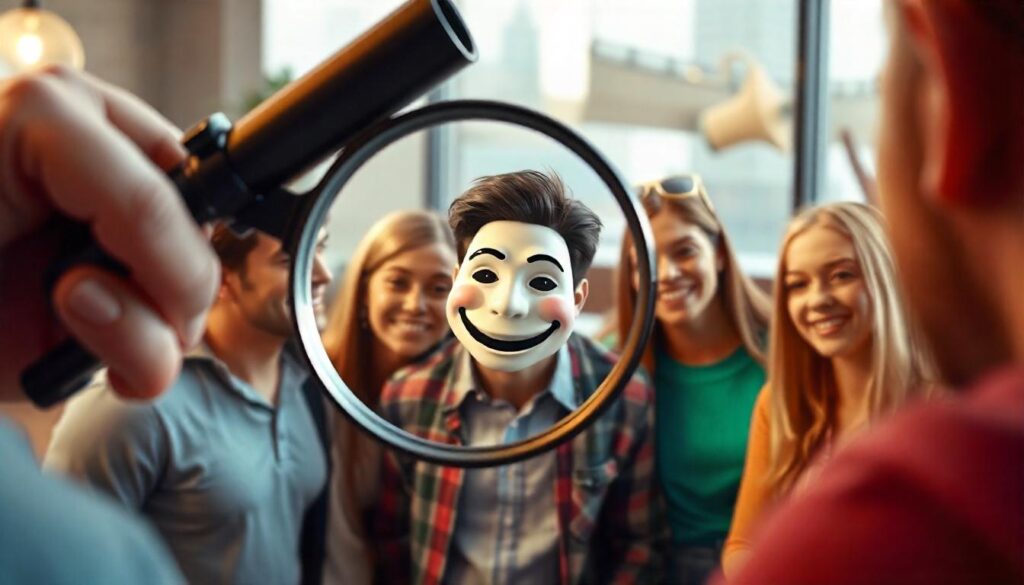Introduction
Friendship is one of life’s most enriching experiences, providing us with support, companionship, and joy. However, not all friendships are genuine. The truth is that many people come across fake friends—those who seem helpful on the surface but lack sincerity or have hidden agendas. Maintaining your emotional health and surrounding yourself with real relationships depends on you recognizing these false pals. This blog will look at how to spot fake friends, how they could affect your life, and how to move forward positively.

Understanding Fake Friends
Fake friends are often characterized by their inconsistency, lack of support, and self-serving behavior. Unlike true friends, who uplift and motivate us, fake friends often drain our energy and contribute to negativity in our lives. Understanding what constitutes a fake friend is essential for maintaining a healthy social circle.
Signs of Fake Friends
Identifying fake friends can be challenging, especially when we want to see the best in people. However, here are some common signs to watch for:
- Inconsistency: They vanish when you need help but only show up in good times. When you’re having a difficulty, you may find that your calls or texts go missed; but, they react quickly when they need something.
- Gossiping: Talking behind your back, they share your secrets with others in gossip. It is obvious sign of disloyalty if you discover that people outside of your immediate circle are talking about your personal concerns.
- Jealousy: Jealousy drives them to feel threatened instead of appreciating your accomplishment. While a phoney friend may minimize your accomplishments or reply with passive-aggressive remarks, a real friend will be actually delighted for your victories.
- Lack of Effort: The friendship seems one-sided, with little of their own effort to keep it intact. It could be time to question the worth of the friendship if you are constantly the one reaching out to arrange events or follow-up.
- Negative Influence: They support actions that compromise your wellbeing or cause harm. This could mean isolating you from other encouraging people or pressuring you to adopt bad behaviors.
The Importance of Recognizing Fake Friends
Recognizing fake friends is vital for your mental and emotional health. Relationships based in insincerity can cause low self-esteem, anxiety, and loneliness. Knowing the indicators helps you to prioritize your emotional well-being and act early to guard yourself.

The Impact of Fake Friends
Having fake friends can lead to a variety of negative consequences, affecting your mental and emotional health. Here’s how:
Emotional Drain
Fake friends often leave us feeling drained and exhausted. Their insatiable demand for approval and attention might make it challenging to pay attention to our own needs and aspirations. After contacts with them, you could find yourself under tension or anxiety and start thinking whether you said or did something wrong.
Erosion of Trust
Being let down by false friends might seriously affect our capacity for trusting other people. This decline of trust can affect sincere friends and new acquaintances as well, which makes it difficult to create significant relationships going forward. Even with those who have shown to be devoted and helpful, trust can take time to restore after it is betrayed.
Self-Doubt
Manipulative behavior by fake friends causes us to doubt our value and judgment. Their criticism of our decisions or their making us feel inadequate could lead to more self-doubt and anxiety. You could start to doubt your achievements and feel unworthy of the wonderful events in your life.
Isolation
One could feel more isolated surrounded by phoney buddies. The emotional distance that results from a friendship without genuineness and support might cause this isolation. Further exacerbating your loneliness could be your reluctance to express your ideas and emotions stemming from a fear of criticism or betrayal.

How to Spot Fake Friends
Identifying fake friends requires careful observation and self-reflection. Here are some tips to help you recognize them:
Trust Your Instincts
Trust your gut if you regularly feel uncomfortable or dissatisfied in a friendship. Your feelings are sometimes quite good markers of the genuineness of the friendship. Observe your feelings after spending time with someone; if you often feel exhausted or uncomfortable, this may indicate that the friendship is unhealthy.
Observe Their Actions
Actions speak louder than words. See how your friend treats you in relation to how they treat others. Real friends treat everyone with respect and kindness, not only to those who could gain from it. Should you observe a pattern of favoritism or thoughtless behavior, it could mean that the motives of your friend are not pure.
Pay Attention to Their Support
A real buddy will assist you in your activities, applaud your achievements and get you through difficult times. Your companion might not be working from your best interests if they seem apathetic or unsupportive. Think about how they react when you tell them great news or ask for advice—are they truly delighted for you, or do they appear preoccupied or contemptuous?
Evaluate the Balance
Think back on whether the friendship is reciprocated. Real friendships survive on mutual respect and work. It could be time to review the relationship if you find yourself often giving more than you are getting. Think about whether your friend values your efforts or whether they are taken for granted.
Look for Patterns
See trends in their activity over time. Fake friends may show certain qualities regularly, including only showing up when they need something or regularly scheduling fallthroughs. Understanding these trends will enable you to decide on the friendship with wisdom.

Moving On from Fake Friends
If you’ve recognized that you have fake friends in your life, it’s essential to take steps to move on. Here are some strategies to help you navigate this process:
Set Boundaries
Establishing well defined limits helps you avoid more emotional damage. Tell your friend your wants and expectations; be ready to separate yourself should they still ignore them. Setting limits can be energizing and supports your self-worth.
Focus on Genuine Connections
Spend time and effort developing relationships with those that inspire and uplift you. Look for buddies that support your objectives and reflect your ideals. Having good influences around you will help you to be much more happy and well-adjusted.
Practice Self-Reflection
Spend some time considering what you wish for from a friendship. Knowing your own wants will enable you to build in the future closer relationships with significance. Think on the traits—such as loyalty, dependability, and support—that most define you.
Seek Support
Surround yourself with individuals who understand your situation and can provide encouragement. Family members, mentors, or encouraging groups could all fit here. Having a solid support system will enable you to organize your emotions and get situational perspective.
Let Go of Guilt
It’s natural to feel guilty when ending a friendship, even if it’s unhealthy. However, remember that prioritizing your mental health and well-being is essential. Letting go of toxic relationships is an act of self-care, allowing you to make space for more fulfilling connections.

The Benefits of Authentic Friendships
Once you’ve distanced yourself from fake friends, it’s crucial to understand the benefits of fostering authentic friendships. Genuine friends can bring immense joy and support into your life, enhancing your overall happiness and well-being.
Emotional Support
Real friends offer a secure environment where you may share your ideas and emotions free from worry about criticism. They cheer you on in trying circumstances and really appreciate your achievements. This emotional support can be quite helpful for developing resilience and handling ups and downs in daily life.
Personal Growth
Surround yourself with real buddies to support your own development and self-discovery. They motivate you to push your boundaries, follow your interests, and aim high. Real friendships create conditions where you may flourish and realize your best potential.
Shared Experiences
Real friends add memories and experiences to your life. From events and celebrations to quiet times of connection, these relationships weave a tapestry of significant interactions that improve your whole quality of life.
Trust and Loyalty
Real friends add memories and experiences to your life. From events and celebrations to quiet times of connection, these relationships weave a tapestry of significant interactions that improve your whole quality of life.
Conclusion
Fake friends can hinder our personal growth and emotional well-being, but recognizing their presence is the first step toward healthier relationships. Understanding the indicators of false friends, their influence on our life, and how to proceed helps us to build a circle of real friends who enhance our life.
Let go of relationships that no longer benefit you without second thought. Accept the chance to surround yourself with people who inspire and motivate you so that you may live in a happy and growing atmosphere. Remember, your time and energy are valuable; spend them sensibly on friendships that feed your spirit.







